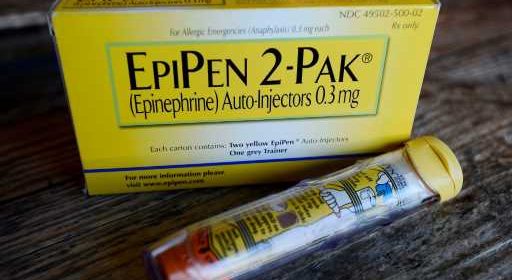Colorado bill aims to limit cost of EpiPens for most residents

A new bill in the Colorado legislature would limit what most residents pay out-of-pocket for EpiPens and similar products that treat severe allergic reactions.
House Bill 23-1002 would cap patients’ out-of-pocket cost for epinephrine auto-injectors at $60 for a pack of two, which is how they’re typically sold, starting in January 2024.
The bill also would create a program for people whose out-of-pocket costs for EpiPens or their generic equivalents weren’t limited by the cap, and who aren’t covered by Medicare or Medicaid. Eligible people could receive two-packs of auto-injectors for $60, as needed, for one year.
Manufacturers would have to either reimburse a pharmacy for the difference between what it paid for the auto-injector and the $60 it collected from a patient, or send the pharmacy a replacement pack.
The proposal is similar to Colorado’s insulin price cap, which limits monthly out-of-pocket costs to $100 in state-regulated plans. People whose insurance isn’t regulated by the state Division of Insurance can fill out an application to receive insulin for no more than $50 a month, for up to a year. The insulin is provided by manufacturers, not the state, so no one tracks how many people have used the application process.
Epinephrine auto-injectors are most commonly used to treat severe allergic reactions to food or insect stings, though some people use them for other conditions.
Epinephrine — also known as adrenaline — is produced in the body during the fight-or-flight response. It has the effect of stimulating the heart and opening the airways, preventing a person from dying of low blood pressure or lack of oxygen during an allergic reaction.
Auto-injectors are popular because they come preloaded with the correct amount of medication, eliminating the step of calculating and measuring a dose based on the patient’s weight.
The bill’s sponsors, all Democrats, are state Sen. Dylan Roberts of Eagle, Rep. Javier Mabrey of Denver and Rep. Iman Jodeh of Aurora.
Sam Gilman, one of the founders of the Community Economic Defense Project, said the cost of two EpiPens had risen from about $90 in 2006 to $690 in 2022, even though the components of an auto-injector cost about $8. Gilman and Mabrey had worked together when the project was focused solely on preventing evictions earlier in the pandemic.
Generic epinephrine auto-injectors are cheaper, though a set of two can still cost $350.
The Community Economic Defense Project estimated more than 500,000 people in Colorado, including about 100,000 children, potentially have severe food allergies, though not all of them need to carry epinephrine.
Gilman, who has a severe peanut allergy, said that when he was a child, his family had to keep four EpiPens around: one for home, one for school, one for his grandparents’ house and one for a friend’s house. At the current price, that’s not affordable for most families, he said, so some are going without lifesaving medication.
“You’re talking a month’s rent,” he said, adding that “you don’t want to choose” between rent and medication.
Sign up for our weekly newsletter to get health news sent straight to your inbox.
Source: Read Full Article
